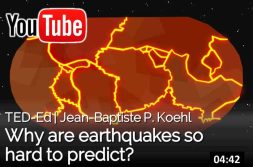Natural disasters
Questions
1. What are natural disasters?
2. Have you ever experienced a natural disaster?
3. What was the last natural disaster you saw on TV?
4. Have you ever prepared for a natural disaster?
5. Are there often natural disasters in your country?
6. What’s the worst natural disaster in your opinion?
7. Do you think natural disasters are happening more frequently in the world today?
8. What’s the best natural disaster movie you’ve ever seen?
Videos
Every 13 or 17 years, billions of cicadas emerge from the ground to molt, mate and die. Adult cicadas only live a few weeks above ground, but you’d be hard pressed to ignore them — they are extremely loud! Rose Eveleth
[more]
explains everything you need to know about these noisy insects, admitting that there’s still some things we just don’t understand.
Lesson by Rose Eveleth, animation by Eli Enigenburg.
Lesson by Rose Eveleth, animation by Eli Enigenburg.
[less]
Category: Nature & Environment
The immense swell of a tsunami can grow up to 100 feet, hitting speeds over 500 mph — a treacherous combination for anyone or anything in its path. Alex Gendler details the causes of these towering terrors and explains
[more]
how scientists are seeking to reduce their destruction in the future.
Lesson by Alex Gendler, animation by Augenblick Studios.
Lesson by Alex Gendler, animation by Augenblick Studios.
[less]
Category: Nature & Environment | Science
Keywords: Natural disasters | Oceans
Take a look at the theories behind why earthquakes occur, what makes them so hard to predict and the warning system technologies we rely on today.
In 132 CE, Zhang Heng presented his latest invention: a large vase he claimed could tell them whenever an earthquake occurred for hundreds of miles. Today, we no longer rely on pots as warning systems, but earthquakes still offer challenges to those trying to track them. Why are earthquakes so hard to anticipate, and how could we get better at predicting them? Jean-Baptiste P. Koehl investigates.
Lesson by Jean-Baptiste P. Koehl, directed by Cabong Studios.
[more]
In 132 CE, Zhang Heng presented his latest invention: a large vase he claimed could tell them whenever an earthquake occurred for hundreds of miles. Today, we no longer rely on pots as warning systems, but earthquakes still offer challenges to those trying to track them. Why are earthquakes so hard to anticipate, and how could we get better at predicting them? Jean-Baptiste P. Koehl investigates.
Lesson by Jean-Baptiste P. Koehl, directed by Cabong Studios.
[less]
Category: Nature & Environment
Keywords: Future | Natural disasters


